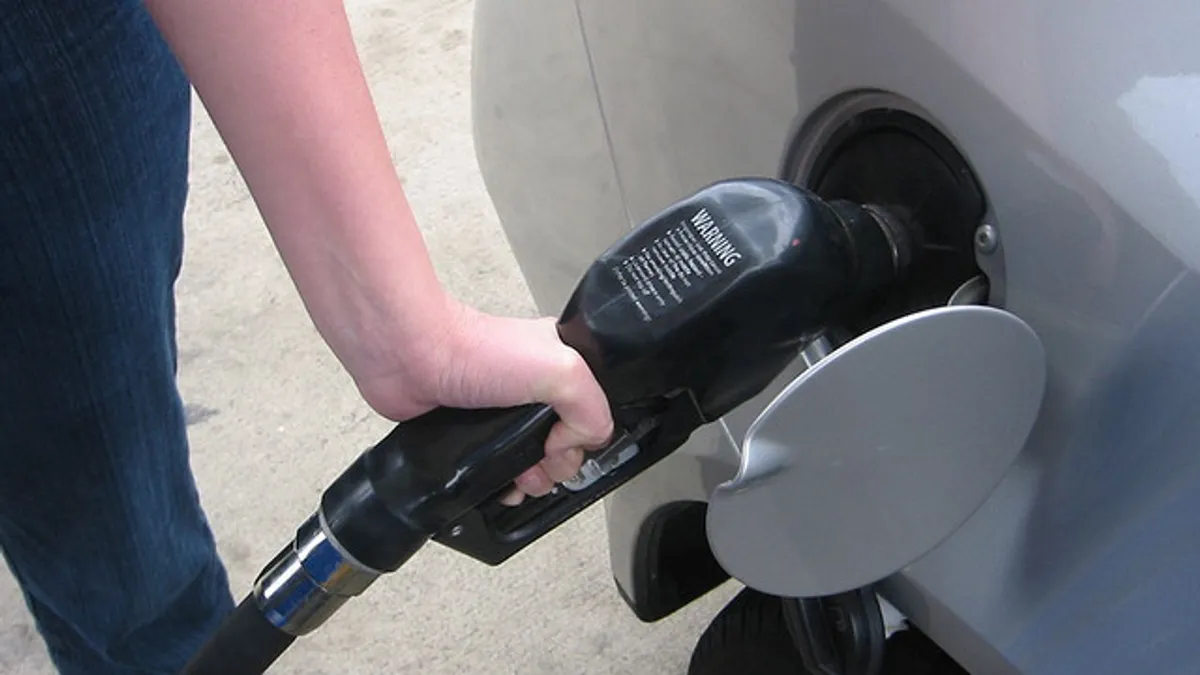Dive Brief:
- U.S. gas stations are "massively under-prepared" for an October deadline to upgrade fuel pumps so they accept credit and debit cards with chips — known as EMV payment technology — the CEO of Gas Pos, a company that sells point-of-sale systems, said.
- Mastercard and Visa have rejected the Merchant Advisory Group’s recent request to extend the deadline, which the card networks had already agreed to delay by several years for U.S. fuel retailers. Retailers outside the fuel sector began phasing in EMV payment capability in 2015, as the U.S. worked to catch up to counterparts in Europe and Asia that had adopted the technology. But fuel retailers fought back, saying the upgrades would cost them a collective $3.9 billion, according to Bloomberg.
- Almost 70% of convenience store owners surveyed by the nonprofit Conexxus said they haven’t upgraded outside pumps to EMV technology. Fuel retailers that don’t upgrade could face costs of as much as $201,000 per store over the next seven years, according to Conexxus data.
Dive Insight:
Conexxus expects the fuel industry to suffer $451 million in card fraud this year, according to Bloomberg. That figure would presumably decrease if fuel retailers were to adopt EMV technology, which generates new codes for each transaction. By contrast, the information on magnetic stripes is permanent and can be copied and stored by hackers.
More than half (52.1%) of gas station owners said they've failed to upgrade to chip technology because of a lack of available software, according to the Conexxus survey, which allowed users to give more than one answer. Nearly 30% said they were waiting for the pump software to be certified. And another 29.2% said they weren’t sure how they'd pay for it.
Joshua Smith, the top executive at Gas Pos, said there's a dearth of both inventory and technicians to install the required pumps, which are manufactured by only a handful of companies.
"Folks that have been trying to transition to EMV will be unable to because of things outside their control," Laura Townsend, senior vice president of the Merchant Advisory Group, told Bloomberg. "But they will bear a significant increase in losses either come October or shortly thereafter because we know fraudsters will find the weakest link."
The convenience store industry is blaming the card networks for not including them in the deadline-setting process.
"Retailers and technology companies should have been part of the planning and decision-making on chip cards from the start," said Anna Ready Blom, director of government relations for the National Association of Convenience Stores. "If they had been, rather than Visa and Mastercard making all the decisions without understanding them fully, we wouldn’t be in this mess."
About 3.7 million, or 80%, of U.S. merchants, accept chip cards, according to Visa, which added that the amount of money merchants lost to counterfeit fraud has declined by 62% since 2015.
"As long as the magnetic stripe readers are in place, fuel dispenser merchants are becoming an increasingly attractive target," the card network said in a November security alert in which it recommended merchants broaden chip acceptance and add security measures such as encryption.
"We believe extending chip technology to fuel pumps is an important step to take to protect businesses and consumers who want to pay securely as well as conveniently," Visa said in a statement.











